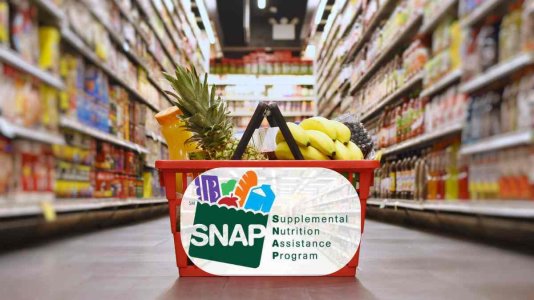Thousands could lose SNAP benefits as October changes roll out—here’s who’s affected
- Replies 1
Major changes to the Supplemental Nutrition Assistance Program (SNAP) have started this October, and they’re leaving many older Americans uncertain about how they’ll put food on the table.
If you’ve been receiving assistance for years or only recently applied, these updates could mean smaller benefits—or none at all—for many households.
Officials say the goal is to “streamline” the system and reduce costs, but the shift is sparking concern among older adults and working families already stretched thin.
Here’s a closer look at what’s happening, who’s most affected, and what steps you can take if your benefits are on the line.
This October, Oregon is at the epicenter of a nationwide shift in SNAP policy, but the ripple effects could soon reach other states.
The Oregon Department of Human Services (ODHS) is rolling out congressionally mandated changes that will impact nearly half of all SNAP recipients in the state.
Out of 740,000 Oregonians currently receiving benefits, a staggering 313,000 are expected to lose some or all of their assistance.
These changes are part of a broader federal overhaul—Donald Trump’s Big Beautiful Bill—aimed at tightening eligibility and reducing government spending on food assistance.
While the stated goal is to encourage self-sufficiency and reduce fraud, the reality for many is a sudden loss of support at a time when food prices and living costs are already high.
Previously, many families qualified for extra SNAP support through the Heating and Cooling Full Utility Allowance.
Now, only households with at least one member aged 60 or older, or someone with a disability, will qualify for this boost.
If you applied or renewed your benefits between July 1 and October 1, expect a notice around October 15, with reductions starting November 1.
Nearly 50,000 households will be affected, with average monthly cuts of $58.
Previously, the cutoff was age 54 and applied to those without children under 18. Now, the net is wider, and even those with children aged 14-17 may be affected.
You’ll need to work at least 80 hours per month to keep your benefits, and the time limit for receiving SNAP without meeting these requirements is just three months.
Exemptions for veterans, homeless individuals, and young adults aging out of foster care are being removed, though there’s a new exemption for Indigenous Americans who meet federal definitions.
Local authorities estimate this will impact about 3,000 people in Oregon alone.
Also read: When grocery trips raise warning signs: What SNAP recipients should know
If you were approved before July 4, you may see your benefits reduced or eliminated later in the year.
However, critics argue that the timing couldn’t be worse. Food prices remain high, affordable housing is scarce, and many older adults and families are already struggling to make ends meet.
For those on fixed incomes or with limited job prospects, these changes could mean making impossible choices between food, medicine, and utilities.
Also read: SNAP benefits hit by massive scam surge—are your funds at risk?
Read next:

Are you or someone you know affected by these SNAP changes? How are you coping, and what resources have you found helpful? Do you have questions about your eligibility or need advice on navigating the new rules?
If you’ve been receiving assistance for years or only recently applied, these updates could mean smaller benefits—or none at all—for many households.
Officials say the goal is to “streamline” the system and reduce costs, but the shift is sparking concern among older adults and working families already stretched thin.
Here’s a closer look at what’s happening, who’s most affected, and what steps you can take if your benefits are on the line.
This October, Oregon is at the epicenter of a nationwide shift in SNAP policy, but the ripple effects could soon reach other states.
The Oregon Department of Human Services (ODHS) is rolling out congressionally mandated changes that will impact nearly half of all SNAP recipients in the state.
Out of 740,000 Oregonians currently receiving benefits, a staggering 313,000 are expected to lose some or all of their assistance.
These changes are part of a broader federal overhaul—Donald Trump’s Big Beautiful Bill—aimed at tightening eligibility and reducing government spending on food assistance.
While the stated goal is to encourage self-sufficiency and reduce fraud, the reality for many is a sudden loss of support at a time when food prices and living costs are already high.
1. Households Receiving Utility Assistance
If your household gets government help with heating or cooling bills, you may see your SNAP benefits reduced.Previously, many families qualified for extra SNAP support through the Heating and Cooling Full Utility Allowance.
Now, only households with at least one member aged 60 or older, or someone with a disability, will qualify for this boost.
If you applied or renewed your benefits between July 1 and October 1, expect a notice around October 15, with reductions starting November 1.
Nearly 50,000 households will be affected, with average monthly cuts of $58.
2. Able-Bodied Adults Without Dependents (ABAWDs)
If you’re between 18 and 64, don’t have a disability, and don’t have children under 14, you’ll face stricter work requirements.Previously, the cutoff was age 54 and applied to those without children under 18. Now, the net is wider, and even those with children aged 14-17 may be affected.
You’ll need to work at least 80 hours per month to keep your benefits, and the time limit for receiving SNAP without meeting these requirements is just three months.
Exemptions for veterans, homeless individuals, and young adults aging out of foster care are being removed, though there’s a new exemption for Indigenous Americans who meet federal definitions.
3. Certain Documented Immigrants
Refugees, asylum seekers, trafficking survivors, and other documented immigrants who previously qualified for SNAP will lose eligibility starting November 1.Local authorities estimate this will impact about 3,000 people in Oregon alone.
Also read: When grocery trips raise warning signs: What SNAP recipients should know
When Do the Changes Take Effect?
- Work requirements for ABAWDs began on October 1 in the Portland metro area and Yamhill, Benton, and Hood River counties. The rest of Oregon will see these changes on January 1, 2026.
- Benefit reductions for those affected by utility assistance changes start November 1.
- Immigrant eligibility cuts also begin November 1.
If you were approved before July 4, you may see your benefits reduced or eliminated later in the year.
Why Is This Happening?
The official line is that these changes are designed to streamline SNAP, reduce costs, and encourage able-bodied adults to re-enter the workforce.However, critics argue that the timing couldn’t be worse. Food prices remain high, affordable housing is scarce, and many older adults and families are already struggling to make ends meet.
For those on fixed incomes or with limited job prospects, these changes could mean making impossible choices between food, medicine, and utilities.
Also read: SNAP benefits hit by massive scam surge—are your funds at risk?
What Can You Do?
1. Check Your Mail and Online Account
Watch for official notices from ODHS or your local SNAP office. These will explain exactly how your benefits are changing and what steps you need to take.2. Review Your Eligibility
If you’re close to the age or disability cutoffs, make sure your records are up to date. If you or someone in your household is 60 or older or has a disability, you may still qualify for higher benefits.3. Meet Work Requirements
If you’re in the ABAWD category, start tracking your work hours now. If you’re struggling to find work, reach out to local employment services or community organizations for help.4. Seek Other Assistance
If you lose SNAP benefits, you may qualify for other programs like food pantries, Meals on Wheels, or local senior services. Don’t be afraid to ask for help—these resources exist for times like this.Read next:
- What to know about this month’s SNAP benefit changes
- SNAP retailers could see changes as USDA proposes new stocking standards
Key Takeaways
- SNAP recipients in Oregon will face major changes from October, with approximately 313,000 people set to lose some or all of their benefits due to new federal rules.
- The cuts will hit three main groups: households receiving utility assistance, able-bodied adults aged 18-64 without young children, and certain documented immigrants.
- Work requirements are being expanded, meaning able-bodied adults without dependents must work at least 80 hours a month or risk losing benefits after three months, and exemptions are being reduced.
- These changes will result in benefit reductions averaging $58 per month for nearly 30,000 households, and will also see around 3,000 documented immigrants cut from the program starting in November.







